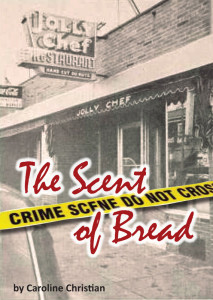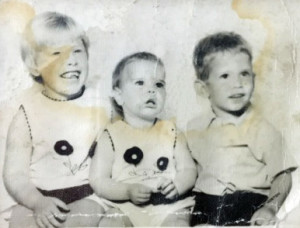Author confronts painful family tragedy in debut novel
By Jay TurnerCaroline Christian never knew either of her parents, but both, she has since learned, really loved the scent of bread.
For her father, Dick Cammarata, it was the smell of his mother’s homemade rolls that he could not get enough of — a scent that once wafted through the air in his downtown Canton restaurant, the Jolly Chef.
 For Christian’s mother, Eleanor, however, it was the scent of a different kind of “bread” — the scent of money — that captivated her as a young woman and would ultimately drive her to kill the man she had vowed to love and cherish.
For Christian’s mother, Eleanor, however, it was the scent of a different kind of “bread” — the scent of money — that captivated her as a young woman and would ultimately drive her to kill the man she had vowed to love and cherish.
It is this striking contrast, between the loving, doting father and husband and the selfish, conniving wife and mother, that forms the basis of Christian’s aptly titled debut novel, The Scent of Bread.
Released last month by the self-publishing platform Xlibris, the book is based on the true story of Christian’s father, D. Richard Cammarata, who was found shot to death in a sandpit on Pine Street in the early summer of 1967.
Just 29 years old at the time of his death and a father of three young children, Cammarata was found lying face-down in a pool of his own blood with his arms handcuffed behind his back and four bullet wounds in the back of his head. The brutal slaying made national headlines and sent shockwaves through the Canton community, where the Cammaratas, a close-knit Italian family, were well liked and respected.
Although early newspaper accounts characterized the killing as a mafia hit, a subsequent police investigation uncovered the ultimate betrayal — a murder-for-hire scheme hatched by Cammarata’s wife and carried out by a local criminal, Julian Stone.
According to an Associated Press story from February 1969, Eleanor Cammarata had hired Stone to kill her husband for half of the $20,000 life insurance payment that she had expected to collect. However, neither conspirator ever saw a penny as the policy expired the day before Cammarata was killed.
Stone later stood trial for the murder of Cammarata and was sentenced to death in the electric chair, although his sentence was later reduced to life imprisonment. Eleanor Cammarata, meanwhile, was indicted as an accessory to murder, but she later pled guilty to a lesser charge of conspiracy and was given the maximum sentence of two and a half years in jail.
In The Scent of Bread, Christian divides the story into two parts, with the first part focusing on the months leading up to her father’s murder and the second part centered on the criminal investigation, ending with her mother being caught in 1968.
“This has been like 20 years in the making, literally,” said Christian, who approached it like a research project, drawing on press clippings as well as personal anecdotes from family members.
Being only 2 at the time and with no personal recollection of the murder, Christian elected to write the book from a third-person omniscient point of view, although she and her siblings are prominently featured and central to the plot — reflecting the central role that they played in their father’s life prior to his tragic and senseless death.
With the exception of herself, her father, and the killer, Julian Stone, all of the characters’ names have been changed; however, Christian said the details of the book are all based on actual events and it is best viewed as a form of “narrative nonfiction.”
“This story is how I understood it to be true,” she said. “Others may know or see it differently, but it’s my story as I know it.”
“It’s true crime,” she added. “It’s mystery; it’s love; it’s betrayal; it’s everything put together.”
Ultimately, Christian said she wrote the book for her readers but also for herself. “I wanted it to draw interest,” she said, “but I wanted it to bring peace at the same time.”
As for her mother, Christian said she is believed to still be alive and possibly living somewhere in the area. According to a February 1969 AP story, Eleanor Cammarata remarried a Navy electronics technician named Francis Clinton Kelly just days before she was sentenced to prison.
A month later, she was brought to court from Worcester County House of Correction to testify at a custody hearing for her children. But only minutes after taking the stand, Eleanor “complained of feeling ill and was excused.” The judge awarded full custody to Dick Cammarata’s parents, and that was the last day that any of the children laid eyes on their mother.
“I want to meet her,” Christian acknowledged. “I don’t want to start a relationship; I don’t want to meet any half sisters or brothers. I just want to know who this woman is that took my father away. I think it’s just more the curiosity. I mean, I’ve never heard her story and I’d like to.”
In the book, Christian characterizes her mother as a self-centered woman and as someone who hated domestic life and who craved her freedom. However, after she sets in motion the events that lead to her husband’s murder, Eleanor, who is named Elaine in the book, has a moment of clarity and sees in the Cammarata family the “love she never realized she truly had.”
“It was all around her, everywhere,” Christian writes.
And while it is unclear whether Eleanor ever had such an epiphany, Christian said she and her siblings were fortunate enough to experience that all-encompassing love from a young age, surrounded and in many ways shielded from the painful truth by their large extended family at the family “compound” on Dedham Street.

Caroline Christian (center), pictured above with her siblings, was only 2 years old when her father was murdered.
“All I ever remember is being with family — aunts, uncles, cousins, grandparents,” she said. “It was a happy life growing up.”
Christian said it was not until she grew older that she started to learn more about her parents, and eventually the curiosity became too great to ignore.
Some of her relatives were forthcoming with information and others less so, she said. But in conducting her own research and then writing the book, Christian said she was able to grow closer to her father’s family and now feels, in some small way, as if she knows the man who she spent a lifetime missing.
As she explained in a recent Facebook post, “I have always wanted to write about my father’s death that took place when I was only 2 years old. I thought it might give me closure … of what, I don’t know. But it worked.”
Christian noted that the book is indeed dedicated to the memory of her father, Dominic Richard Cammarata. “This is my book,” she said proudly. “This is his book. This is our story.”
To purchase a copy of The Scent of Bread in paperback, hard cover, or e-book form, go to www.barnesandnoble.com.
Short URL: https://www.thecantoncitizen.com/?p=33024











